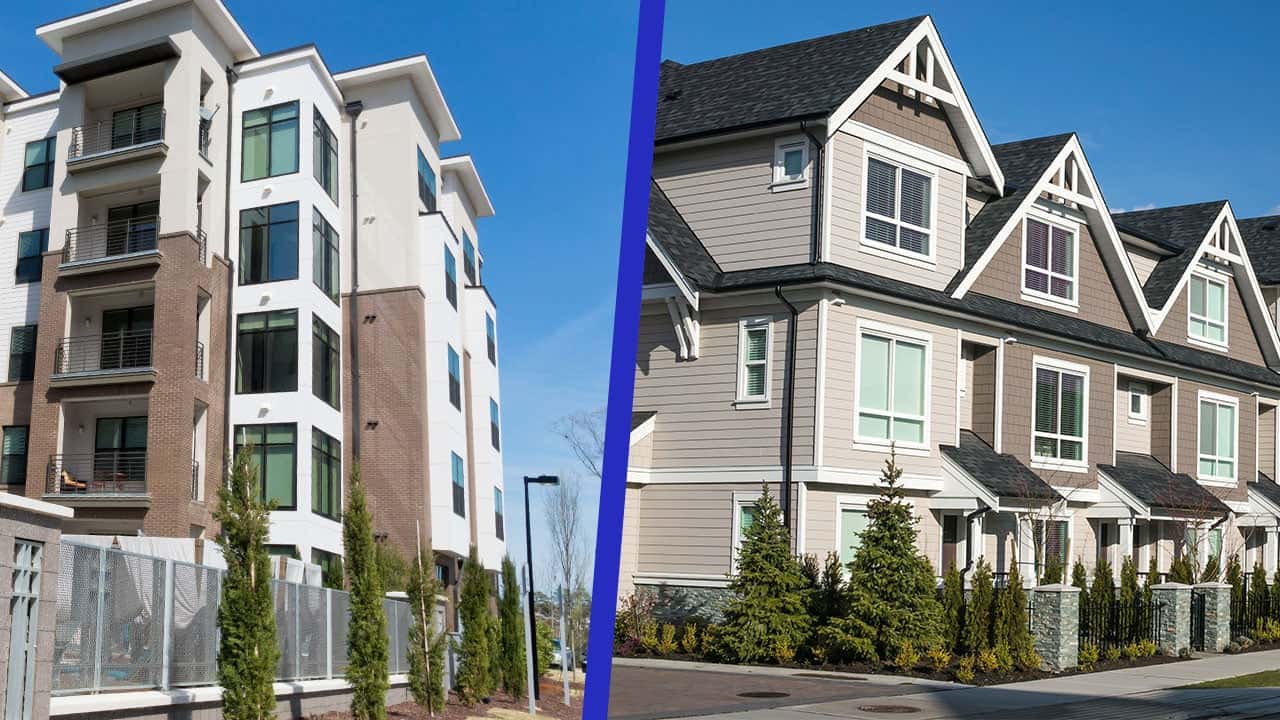If you’ve narrowed your home search down to a condo or a townhouse, you’re already well ahead of most first-time buyers. But the next question is more complex: which one is the smarter financial choice?
This article goes beyond definitions. We’ll compare upfront and monthly costs, financing differences, long-term appreciation, and resale value to help you make the right decision based on your goals—not just your zip code.
If you’re still learning the basics of these property types, you may want to start with our condo vs townhome vs PUD vs Twinhome guide for definitions and ownership structures. This article focuses specifically on the financial pros and cons of each to help you make a smarter, long-term decision.
Upfront Costs and Financing Differences
Purchase Price and Square Footage
In many markets, condos are less expensive than townhomes. According to data from the National Association of Realtors, the median condo price is typically 5–15% lower than a comparable townhouse, especially in urban centers.
But lower price doesn’t always mean better value. Condos are also usually smaller—meaning your price per square foot may actually be higher.
Financing Considerations
Financing a condo can be more complicated than financing a townhouse. That’s because the lender isn’t just evaluating your financials—they also evaluate the entire condo project. If there’s pending litigation, inadequate reserves, or high investor ownership, you may not qualify for a conventional loan at all.
Townhouses, on the other hand, are generally treated like single-family homes and don’t require project approval.
Also important: Some lenders may require a higher down payment on a condo, especially in buildings with financing risk. This can affect your ability to avoid PMI—or qualify at all.
Closing Costs and HOA Buy-ins
Some condo associations require buyers to pay 1–2 months of HOA dues up front, or contribute to a reserve fund at closing. Townhouses may have smaller or no such buy-ins, though this varies.
Monthly Costs Breakdown
HOA Fees
Condos almost always have higher HOA fees than townhouses—but for good reason. Your HOA may cover:
-
Building insurance
-
Exterior maintenance
-
Landscaping
-
Amenities like gyms or pools
Townhouses usually have smaller HOAs, but you’re on the hook for more upkeep.
For example, a condo may have an HOA fee of $400/month, while a townhouse may be just $150/month. But you’ll need to budget for exterior maintenance in the townhouse separately.
Maintenance and Insurance Costs
Condo owners typically only insure the interior structure and contents (known as an HO-6 policy). Exterior repairs and roof replacements are handled by the association. In contrast, townhouse owners may need a standard homeowners policy, since they’re responsible for the exterior.
Over time, this means:
-
Townhouses require more personal maintenance budgeting
-
Condos may issue special assessments for major repairs not covered by reserves
Appreciation and Resale Value
How These Properties Appreciate
Townhouses often appreciate faster than condos in suburban markets due to larger footprints, more privacy, and stronger family appeal. They’re typically more desirable for long-term occupancy and resale.
Condos may perform better in dense urban markets, but their appreciation tends to trail single-family homes and townhouses in more balanced areas.
Resale and Buyer Demand
Condo resale can face challenges:
-
Smaller buyer pool (some lenders won’t finance certain condos)
-
Concerns over HOA health or pending litigation
-
Limits on FHA or VA financing
Townhouses often have broader appeal, especially if they include a garage, yard, or multi-level floor plan.
Lifestyle Fit vs Investment Fit
Your personal goals matter just as much as the math. Here’s when each might make more sense:
Who Should Consider a Condo?
-
Urban professionals who want to live close to city centers
-
Buyers who value low-maintenance living (no yardwork or exterior upkeep)
-
Short-term buyers or those planning to move within 5 years
-
Buyers with tighter budgets
Who Should Consider a Townhouse?
-
Buyers planning to stay 5+ years and build equity
-
Those who want more privacy and control
-
Families, couples, or buyers planning to rent it later
-
Buyers concerned with resale value or long-term appreciation
Condos vs Townhouses: Financial Comparison Table
| Feature | Condo | Townhouse |
|---|---|---|
| Typical Purchase Price | Lower | Slightly Higher |
| Average HOA Fees | Higher (more inclusive) | Lower (less coverage) |
| Financing Complexity | Higher (requires project approval) | Lower (treated as SFR) |
| Insurance Costs | Lower (HO-6) | Higher (full homeowners policy) |
| Maintenance | Mostly covered by HOA | Owner-managed (exterior, yard, etc.) |
| Appreciation Potential | Moderate | Higher, especially in suburbs |
| Resale Flexibility | Sometimes limited | Easier to resell and finance |
FAQs – Financial Differences Between Condos and Townhomes
Do townhouses appreciate faster than condos?
In most suburban areas, yes. Townhouses offer more privacy and land ownership, which leads to stronger long-term value growth.
Are condos harder to finance?
They can be. Lenders often require project approval, which includes a review of the HOA’s finances, occupancy rates, and litigation history.
Which has higher HOA fees: condos or townhomes?
Condos usually have higher fees because they cover more—like exterior insurance and shared amenities. Townhouse HOAs tend to be leaner.
Can a townhouse be a good rental investment?
Yes, especially if it’s in a family-friendly neighborhood with good schools. Townhouses are often easier to rent than condos in suburban areas.
Do lenders treat condos and townhomes differently?
Yes. Townhouses are typically treated like single-family homes, while condos undergo extra scrutiny based on the health of the entire development.
Which has lower maintenance costs long term?
Condos tend to be more predictable in the short term but may carry special assessment risks. Townhouses require more day-to-day responsibility but fewer surprises.
Final Thoughts – Which One Makes More Financial Sense?
If you’re looking for low maintenance, a lower purchase price, and walkability, a condo might be the right fit. But if you’re thinking long-term—equity growth, resale value, or even future rental potential—a townhouse typically offers more financial upside.
Want to run the numbers? Try our tools:
-
Use the PMI Calculator to estimate monthly mortgage insurance based on down payment
-
Try the Mortgage Refinance Calculator if you’re comparing loan terms
-
Check out Loan Compass for personalized loan scenarios based on your goals
Related Posts

Financing High-Rise Condos: What Makes Condo Mortgages Different (and Riskier)
Buying a condo might seem like a simpler path to homeownership — especially in urban areas where high rise buildings dominate the skyline.

Real Estate Tax Strategies for Primary, Second, and Investment Homes
Understanding effective real estate tax strategies is essential for any property owner—whether you’re buying your first home, considering a vacation property, or expanding

Condo vs Townhouse: Plus PUDs and Twinhomes Explained for Homebuyers
If you’re exploring housing options, one of the first comparisons you’ll make is condo vs townhouse. These property types may look similar, but

